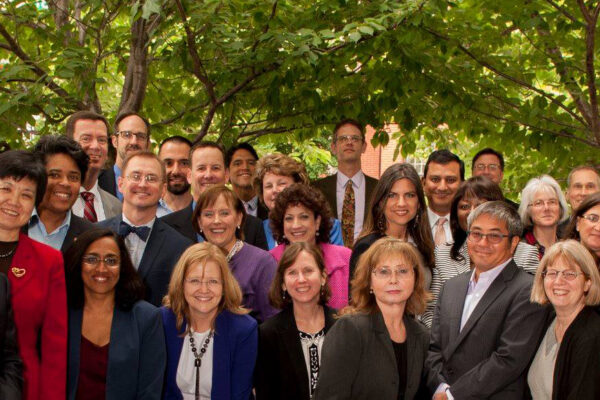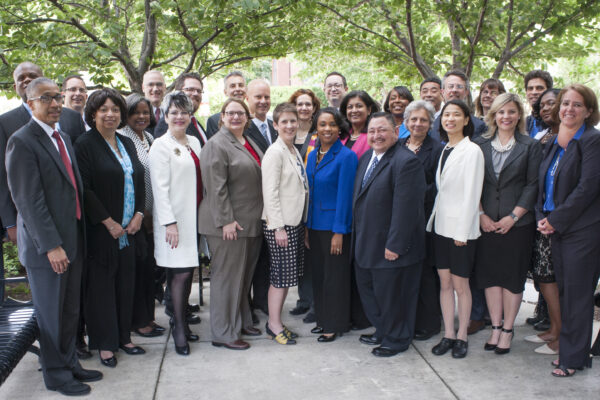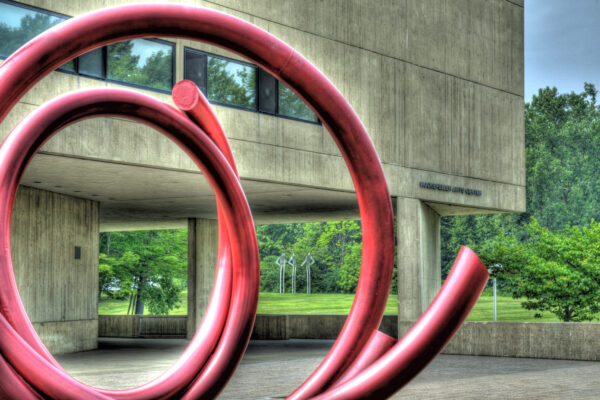ACE Fellows John Marx and Nancy Wayne are conducting an ongoing longitudinal study of the 2018-19 ACE Fellows class. The data in this post are derived from surveys conducted during and at the end of that fellowship year.
For more on succession planning, see Andy Brantley’s post, A Call to Action Regarding Succession Planning and Sustainability.
As we write, members of the 2018–19 ACE Fellows class are returning to their home campuses after spending the year shadowing host presidents, chancellors, and provosts, who provided front row seats to the challenges facing the nation’s colleges and universities.
To return home is to return a debt and, more importantly, to receive an opportunity. While the Fellows’ salaries were paid by their home institutions, “reentry,” as it is jokingly referred to by Fellows, provides the chance to bring back new knowledge and experience.
Freeman A. Hrabowski, president of the University of Maryland, Baltimore County, recounts how UMBC gains a “great deal” from ACE Fellows who have spent time on other campuses. “They tend to return with a much broader understanding of higher education issues and, even more important, how our campus compares,” he said.
John C. Cavanaugh, president and CEO at the Consortium of Universities of the Washington Metropolitan Area, echoes that sentiment.
“I have always pushed hard for (former) Fellows to keep the mindset they acquired during the Fellowship,” he says, “and to continue applying it to issues back home. It always worked; we always benefited a great deal from their newly acquired approach that often led to innovative ways of handling challenging issues.”
But it is important to note that both the returning Fellow and the home institution have a role to play in ensuring a smooth reentry process. Fellows should develop a plan for applying what they have learned and perhaps taking on new responsibilities to benefit their institution. In turn, institutions should scrutinize their infrastructure for training and promoting from within to take full advantage of what a returning Fellow has to offer. As Andy Brantley, president and CEO of the College and University Professional Association for Human Resources, notes in his post, this is an area where many institutions lack practice and training.
With all this in mind, we are conducting a longitudinal study of the 2018–19 ACE Fellows class to find out what they have learned and what they will do with that education.
Although we are barely six months into our research, we have already discovered something important about what the fellowship means to its participants.
Among our cohort, a year on fellowship yielded a notable increase in confidence about career advancement. Prior to starting the ACE Fellows Program, the majority of Fellows reported ambivalence about their ability to progress. When asked to gauge their confidence on a 5-point Likert scale (where 1 equals lowest confidence and 5 equals highest), the largest number of respondents landed right in the middle. By the end of the fellowship year, in contrast, nearly three-quarters answered with a 4 or a 5 when asked whether they felt confident in their ability to advance.
Shift in confidence that Fellows will be able to progress in their career between prior to the start of the program (left panel) and at the end of the program (right panel).
If ACE Fellows are already a motivated bunch before the fellowship, they return home hungrier still. The 2018–19 cohort reports returning to differing situations. One-third of the Fellows anticipate taking on new projects or new positions at their home institutions. Another third are returning to positions they had before the fellowship. Our research so far shows that the remaining third of our cohort see themselves as less likely or simply unlikely to use what they have learned at their home institution. We look forward to checking in with these ACE Fellows at our next survey.
If the Fellows in our cohort have questions about what happens next, now that the fellowship is over, potential nominators surely ask comparable questions as they consider potential nominees. The authors of ACE’s review Looking Back and Looking Forward observe that for all nominees looking to the fellowship as a tool to help “identify, develop, and retain key faculty, staff, and administrators,” they also “can be apprehensive to invest in a potential ‘flight risk.’” The review quotes a nominator summing up one response to this tension by suggesting “the old concern ‘What if I train them and they leave’ ought to be ‘What if I don’t train them and they stay?’”
The vast majority of respondents (89 percent) indicated that by the end of their ACE fellowship year, they received valuable leadership training and experiences at their host institution that were missing from their experiences at their home institution. This, of course, is integral to the value of the Fellows Program. The challenge and opportunity for both newly graduated Fellows and their home institutions is figuring out what to do with this newfound expertise.
Examples of what Fellows reported learning include “Strong leadership, teamwork, internal university communications, building and maintaining trust.” One Fellow recounted having “opportunities to witness and understand high level decision making, how to conduct a capital campaign, [and] organizational adaptation to the changing needs of the economy and society.” Another appreciated the chance to “participate and observe cabinet level meetings as well as BOT [Board of Trustee] meetings . . . and one-on-one meetings with the president and several leadership team members.”
Our respondents confirmed that the fellowship provides room for education that couldn’t happen while working a full-time job. With a year or even just a semester on a host campus, Fellows reported such opportunities as gaining “exposure to different parts of the university; exposure to women leaders.” One found time for intensive experiences like “deep dives into budgets.” Another indicated having chances to receive the kind of “close interaction and personalized feedback from [a] host mentor” that is the hallmark of the ACE Fellows program.
The qualities that presidents Hraboswki and Cavanaugh value in their returning Fellows are not new technical skills but rather those tied to broader experiences of the sort described by our respondents.
“In my view,” Cavanaugh explains, “forming and asking incisive questions, and getting and analyzing the truly critical information are the most important skills for a leader to acquire, and the Fellows Program is well designed to provide that opportunity.”
Hrabowski agrees: “It’s always helpful for academics to see how others solve problems and to be able to put their own home campus in perspective.”
These presidents appreciate that Fellows learn to cultivate a greater sense of curiosity, or what Cavanaugh calls “wondering.” What Fellows experience allows them to leverage existing knowledge, and this can allow them to contribute in new ways.
Vital as curiosity and greater perspective may be, one may not promote an administrator simply for acquiring those qualities. To the extent that higher education administration is made up of guilds, the acquisition of specialized skill sets may matter more.
Nor are qualities of the sort that Hraboswki and Cavanaugh describe all that easy to express in the first place. It’s a tautology perhaps, but you only know if returning Fellows have learned “curiosity,” “questioning,” “perspective,” and the like if you put them in situations where they can demonstrate “curiosity,” “questioning,” and “perspective.”
Will the 2018–19 ACE Fellows find themselves in such situations? We’ll be watching. We have more surveys planned. We also have the personal investment born of traveling together through the fellowship with a cohort of colleagues who have become friends.
In the meantime, we offer this advice to Fellows present and future: curiosity can pay dividends. Ask questions. Be ready to bring a problem-solving attitude back home. We should also offer thanks to mentors and nominators who value that sense of “wondering,” as Cavanaugh calls it, and who are curious themselves about what new perspectives their nominees may bring back to their campuses.
The study and all methods were carried out in accordance with and approved by the institutional review board of the University of Callifornia, Los Angeles and UC Davis. Out of 43 Fellows, 38 completed the Part 1 survey asking about their experiences prior to the ACE fellowship year, and 35 completed the Part 2 survey asking about their ACE fellowship experiences.
If you have any questions or comments about this blog post, please contact us.


